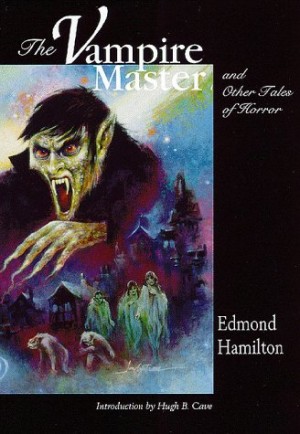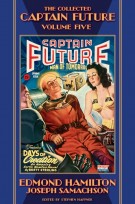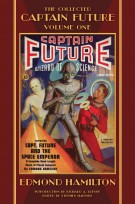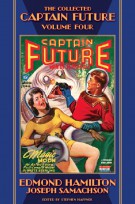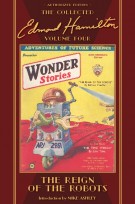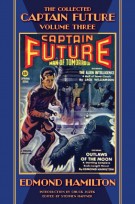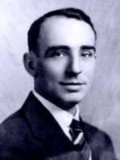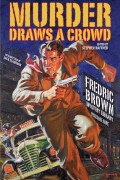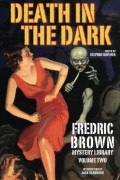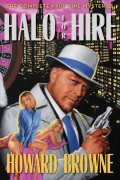The Vampire Master and Other Tales of Horror
Introduction by Hugh B. Cave
Cover Art by Jon Arfstrom
ISBN-13 9781893887060
360-page Hardcover
While primarily known for his adventures of terrestrial doom and interstellar peril, Edmond Hamilton also wrote a number of tales of mystery and horror. The Vampire Master and Other Tales of Horror collects nine stories from pulp magazines such as Strange Tales of Mystery and Terror, Thrilling Mystery, and Weird Tales.
Included are Hamilton’s four tales of supernatural terror that appeared in Weird Tales under the nom de plume Hugh Davidson. Two of these stories feature the psychic detective, Dr. John Dale.
An introduction by Hugh B. Cave, recipient of the World Fantasy Award for Lifetime Achievement, provides a personal glimpse at the bygone days of writing for the pulp magazines.
Included as an afterword is an essay by Hamilton reflecting on the halcyon days of writing for Weird Tales.
"Introduction" by Hugh B. Cave
"Dead Legs" (Strange Tales of Mystery and Terror, Feb '32)
"Vampire Village" (Weird Tales, Nov '32)
"Snake-Man" (Weird Tales, Jan '33)
"The Vampire Master" (Weird Tales, Oct, Nov, Dec '33, Jan '34)
"The Earth Dwellers" (Thrilling Mystery, Apr '36)
"Beasts That Once Were Men" (Thrilling Mystery, May '36)
"The House of the Evil-Eye" (Weird Tales, June '36)
"Children of Terror" (Thrilling Mystery, Sep '36)
"Woman in the Ice" (Thrilling Mystery, Sep '38)
"The Science-Fiction Field" by Edmond Hamilton
“Known primarily today as a writer of Science Fiction, Edmond Hamilton (1904-1977) possessed the pulp-trained ability to work capably in many genres. Haffner Press has here gathered up nine of Hamilton’s spookier tales, and the result is a night’s worth of lively, old-fashioned, shivery reading well worth your investment. (Haffner Press books are all compiled with craft and dedication, producing handsome, collectible volumes.)
As befits the rationalistic side of Hamilton, these tales are all rather straightforward almost to the point of bluntness. No Lovecraftian atmospherics here, no ornate Clark Ashton Smith language. In this fashion, Hamilton can be seen as a forerunner of a kind of streamlined Horror that was to burgeon during the second half of the 20th century.
Nonetheless, a crisply arranged tale like “Dead Legs”—in which a mobster engineers a horrifying transplant that backfires—still conveys its full share of grim and gruesome thrills. The titular novel, a little slow to get going, finally takes off in a macabre spectacle of beheadings and stakings. A linked story, “The House of the Evil Eye,” featuring the same protagonist, psychic detective Dr. John Dale, is more compact, but less eerie. And even the rationalized tales like “The Earth Dwellers” and “Beasts That Once Were Men” sustain their shocks without supernatural intervention.
Hamilton was the kind of all-around solid writer seldom seen these days, and it’s a pleasure to have these gems brought back to light.”
—Paul di Filippo, Realms of Fantasy
"If I may be pardoned for presuming to comment before I have read all of it, ‘The Vampire Master’ is deftly done, its treatment of the vampire material unusual, showing the operation of a mind more strongly logical than is usual in writers of the supernatural."
—Jack Williamson, Weird Tales, December 1933
". . . effective treatment of the vampire trope in the titular story (which is actually a full-length novel!); originally ran as a serial in Weird Tales and, as such, builds to a couple of cliffhangers within the novel before reaching the shuddery climax. It's not Carmilla or Dracula, but it holds up well today and is certainly better than much of the Anne Rice-inspired dreck with mincing fops and angst-ridden poseurs sipping blood from cordial glasses. Gerritt Geisert may not be as memorable as Dracula or some of the long-running series characters today, but he is a convincing villain. And Hamilton is a skillful enough author to make his demise the result of careful planning rather than have his vampire doing something so unbelievably stupid that the reader is left wondering how he could possibly have survived all those years . . . a collection that's a lot of fun and filled with "Cool Old Stuff" that you've likely never run across . . . I'm certainly glad that Haffner Press saw fit to gather these obscure pieces into book form.”
—John Pelan, www.gothic.net
"A primal shaman spinning fables of fear, fantasy, and science in a time before genres were rigidly defined, Edmond Hamilton crafted tales of cosmic space voyages and harried descents into inner-space with intelligence and enthusiasm . . . Hamilton’s ideas were as cosmic as his style was intimate. Keen observation and concise imagery lend his stories believability . . . "Snake Man,” a masterful exercise in suspense, is a ‘how to’ manual of how to use the senses to evoke emotion. As our hero, an eccentric snake hunter in the Florida swamps, tracks the monstrous reptile who leaves behind chillingly wide tracks, we’re brought alongside him as a result of Hamilton drowning us in sensory overload, depicting the sights, sounds, feel, and taste of the humid air, the slime, the palpable feeling of dread closing in . . . The collection is an admirable introduction to a skillful if unpretentious storyteller whose direct approach to fear and thrills are well suited to his brisk sentence structure and assessable language. Good, scary fun!
—William P. Simmons, www.hellnotes.com
